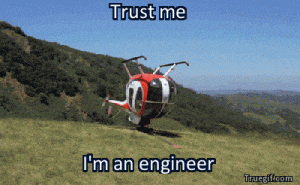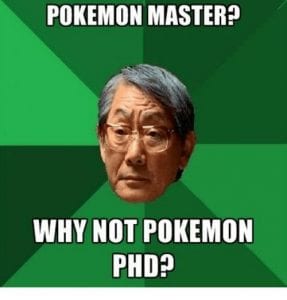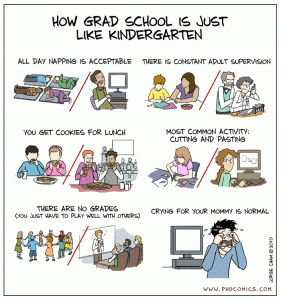I cannot believe it’s already almost the mid-semester break. This brings about tests and stress (and also the Engineering Revue which you should all be going to watch). This semester has hit me a lot harder than the first one – the three Mech related courses are tough. All three are very content and concept heavy – Dynamics, Thermofluids and Object-Oriented Design. I’ll cover these more when we reach the end of the Semester… if I survive 😢.
Something I’ve found myself wondering a lot, particularly in times of high stress, strain and fatigue, is “where is this all leading to?”. Of course, we all know that you’ll have to do 800 hours of practical work experience in your chosen specialisation, and ideally that’ll lead to graduate positions. But often overlooked, is the option to stay in academia/research and pursue post-graduate study. As I’ve toyed with this idea, I’ve asked a couple people I know who are currently pursuing this route. So, without further ado, I’d like to introduce Sahan Jayatissa, Nicholas Kay and Dr Hazim Namik.
The Post-Grads
Sahan is a Masters student in the Auckland Bioengineering Institute. He studied Mechatronics Engineering. His project is to make a new fabrication technique for a gut-on-a-chip which can be used as a new viable method for drug screening. He suggests this TED talk to learn more about it.
Nicholas is a second year PhD student. He studied Mechanical Engineering. His PhD research is on investigating the change in the performance of small fixed-wing Unmanned Aerial Vehicles (UAVs) in adverse weather conditions. For more information from the Aerodynamics and Thermofluids post-grads, follow their Facebook page: AeroThermo Research Group Auckland.
Hazim is currently a lecturer we all know and love. He studied Mechatronics Engineering with his PhD in Mechanical Engineering. His PhD research topic was on the control of floating wind turbines and his thesis can be found here.
*Just a note: I have had to condense the descriptions of their post-grad projects for the sake of length, but if you do have more questions about that in particular, please let me know and I’ll be more than happy to direct you to the right person 😊
The Questions
Why did you choose Mechatronics/Mechanical Engineering?
Sahan: “While my strongest passion was in zoology I realised that I was not good nor did I enjoy writing essays and reports. Hence, I followed my other passion, building little techy gadgets which I had been doing since I was little with my father. And well, Mechatronics is the ideal specialization to build little techy gadgets.”
Nicholas: “Planes and trains! I have always been an aviation enthusiast, with an interest also for trains, so mechanical is my mindset. While I could have gone overseas to study Aerospace for my undergraduate, a Mechanical Engineering degree is much better for career options. An Aerospace degree only has one field, which is not particularly large in terms of job openings. In contrast, a Mechanical Engineering degree can still lead to aerospace research, while allowing a much wider range of alternative career paths and a thorough overall understanding of the different aspects of engineering. Plus, within the University of Auckland, it’s the Department of Mechanical Engineering with the Wind Tunnels!”
Hazim: “I had a general interest in figuring out how things worked. When I was in first year, I really enjoyed design and CAD as well as programming. Mechatronics seemed to combine my interest for mechanical design, CAD, programming, and electronics.”
Why did you decide to pursue a postgraduate degree?
Sahan: “It was a pretty easy decision for me because I have always wanted to be a lecturer and researcher and share my passion with others. To get into lecturing it is imperative that I do a postgraduate qualification so here I am enjoying my Masters life in the Auckland Bioengineering Institute.”
Nicholas: “I have always been more theoretically-inclined, postgraduate research is appealing. Unlike undergraduate studies and school, you also get to own more of the research: you have control over the topic, scope and how it is done. It is a good way to develop your leadership capabilities and intelligence while studying something you enjoy. Additionally, I had always intended to carry on with more aerospace-focused studies after completing my undergraduate degree to get closer to long-term research in that field. With postgraduate research, I can explore more into the field I enjoy while having access to all the required facilities and getting recognition for any new findings.” [Nicholas is a big fan of the Newmarket Wind Tunnels – no pun intended.]
Hazim: “When I was in my fourth year, I took an elective about multivariable control system (I think the current equivalent course would be MECHENG 724) and that got me really interested in this topic and its possible applications. I wanted to learn more about it and apply it to a real-world problem that I may not get the chance to work on in that specific field if I had found a graduate engineering position. Furthermore, getting the university Doctoral Scholarship made the decision easier by making the financial aspect similar to a starting graduate position, however, I would be getting a higher degree/qualification after 3-4 years.”
What is some advice you would give to current first year students?
Sahan: “Find out what you really enjoy doing. I was lucky enough to know what I was doing and looking back, I definitely picked the right specialisation, but there are a lot of students that don’t and end up picking the wrong one. Remember, it’ll most likely end up being your field of work for life so make sure you enjoy doing it. Oh, one more thing, HAVE FUN!! Academics get harder and more challenging from here onwards so enjoy your first year!!!”
Nicholas: “Get to know people! The people you know at uni are people you will know for the long run. Get out, join clubs, and enjoy the freedom of the uni experience. It is also good to meet people before the specialisations come into play, as for some that can act as a barrier, but the more people you know across a range of specialisations, the more well-rounded your knowledge of the engineering field will be. Go out and enjoy the experience! If you don’t know which specialisation you want to go into, consider going to the Final Year Project Presentations in second semester to see what interests you. Or, if you see a real-world problem you have ideas or opinions on, consider what route would be best for putting you there to be able to help resolve it. Engineering is all about problem solving. If in doubt, Mechanical has the Wind Tunnels!”
Hazim: “In terms of doing well academically, finding a balance between the academic and social life is key. Therefore, time management is crucial. Staying organised, disciplined, and proactive will mean you can get things done efficiently, which will give you the free time you need for your social life. Also, find out your learning style; e.g. are you a visual learner or verbal? Knowing how you learn will help you plan how you study. In terms of choosing a specialisation, I would recommend choosing one that you love doing or are interested in it. Don’t choose a specialisation because you think you’ll get paid well. If you are lucky and you find a job that you love doing, then you will not feel like you are working at all.”
What is some advice you would give to those looking to pursue postgraduate study?
Sahan: “Try to stay on top of your projects. These usually take way longer than you expect and end up being your biggest time sink. Also, try to think about where your courses will take you… i.e. see the bigger picture, though this is hard with how some courses are structured 😑). This will really help in finding a job or a postgraduate project that interests you.”
Nicholas: “From experience, I would recommend considering taking a year of additional practical work experience if you have that option. It’s not for everyone, but gives you more time to think through options, gives a mental break from four years of study and helps pay off your loan a bit faster! One potential hazard for those doing postgraduate research is that you become too theoretical, with little practical experience. …Choose your supervisor well and choose a topic you are keen on. You don’t want to burn out halfway through because you chose a random topic just for the Dr title! … While [going overseas for post-graduate studies] may look appealing, staying with the University of Auckland means that you know the staff and structure of the department well, allowing you to make the most of what is available and so it becomes an easy transition… [In] Postgraduate, you are the one controlling the equipment and carrying the research forward.”
Hazim: If you want a taste of what research is like, try applying for the summer research scholarships; these count towards your required work hours. For doing well academically, my advice for first year students still applies here.”
—
So, there you have it! The diversity of their PhD projects also lends to how diverse the opportunities are for Mechatronics. Whilst Nicholas’ and Hazim’s PhDs are in Mechanical Engineering, there is significant overlap between Mechanical and Mechatronics which adds to the range of potential PhD topics (and Part IV Project) options available to Mechatronics students. Huge thanks to Sahan, Nicholas and Hazim for their post-grad insights. While it is definitely a long way away, it’s always worthwhile to have the knowledge.
Catch y’all in the next post! If you have any burning questions and simply can’t wait, feel free to flick me a message on Facebook (Jaynie Ng). 😊
-Jaynie


